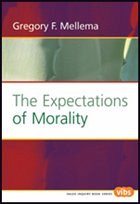"This book opens up a whole new, and intriguing vista. Eventually others will see Mellema's discussion as having shattered the old rigidities and made us see that the ethic of action is far richer, far less stereotyped, than we have been taught to think."
Nicholas Wolterstorff, Noah Porter Professor,
Department of Philosophy, Yale University
----
Moral expectation is a concept with which all of us are well acquainted. Already as children we learn that certain courses of action are expected of us. We are expected to perform certain actions, and we are expected to refrain from other actions. Furthermore, we learn that something is morally wrong with the failure to do what we are morally expected to do.
A central theme of this book is that moral expectation should not be confused with moral obligation. While we are morally expected to do everything we are obligated to do, a person can be morally expected to do some things that he or she is not morally obligated to do.
Although moral expectation is a familiar notion, it has not been the object of investigation in its own right. In the early chapters Mellema attempts to provide a philosophical account of this familiar notion, distinguish it from other types of expectations, and show how it is possible to form false moral expectations. Subsequent chapters explore the role of moral expectation in agreements between people, analyze ways that people avoid moral expectation, illustrate how groups can have moral expectations, and view moral expectation in the context of our relationship with divine beings. The final chapter provides insight into how moral expectation operates in people's professional lives.
Table of contents:
Nicholas WOLTERSTORFF: Editorial Foreword
Acknowledgments
ONE Introduction
TWO Faulty and Unformed Expectations
THREE Reasonable, Social, and Failed Expectations
FOUR Oughts and Expectations
FIVE Agreements and Expectations
SIX Avoiding Expectation
SEVEN Group Expectation
EIGHT The Symbolic Dimension
NINE Offence and Expectation
TEN Divine Expectation
ELEVEN Expectation and Professional Ethics
Works Cited
About the Author
Index
Nicholas Wolterstorff, Noah Porter Professor,
Department of Philosophy, Yale University
----
Moral expectation is a concept with which all of us are well acquainted. Already as children we learn that certain courses of action are expected of us. We are expected to perform certain actions, and we are expected to refrain from other actions. Furthermore, we learn that something is morally wrong with the failure to do what we are morally expected to do.
A central theme of this book is that moral expectation should not be confused with moral obligation. While we are morally expected to do everything we are obligated to do, a person can be morally expected to do some things that he or she is not morally obligated to do.
Although moral expectation is a familiar notion, it has not been the object of investigation in its own right. In the early chapters Mellema attempts to provide a philosophical account of this familiar notion, distinguish it from other types of expectations, and show how it is possible to form false moral expectations. Subsequent chapters explore the role of moral expectation in agreements between people, analyze ways that people avoid moral expectation, illustrate how groups can have moral expectations, and view moral expectation in the context of our relationship with divine beings. The final chapter provides insight into how moral expectation operates in people's professional lives.
Table of contents:
Nicholas WOLTERSTORFF: Editorial Foreword
Acknowledgments
ONE Introduction
TWO Faulty and Unformed Expectations
THREE Reasonable, Social, and Failed Expectations
FOUR Oughts and Expectations
FIVE Agreements and Expectations
SIX Avoiding Expectation
SEVEN Group Expectation
EIGHT The Symbolic Dimension
NINE Offence and Expectation
TEN Divine Expectation
ELEVEN Expectation and Professional Ethics
Works Cited
About the Author
Index

